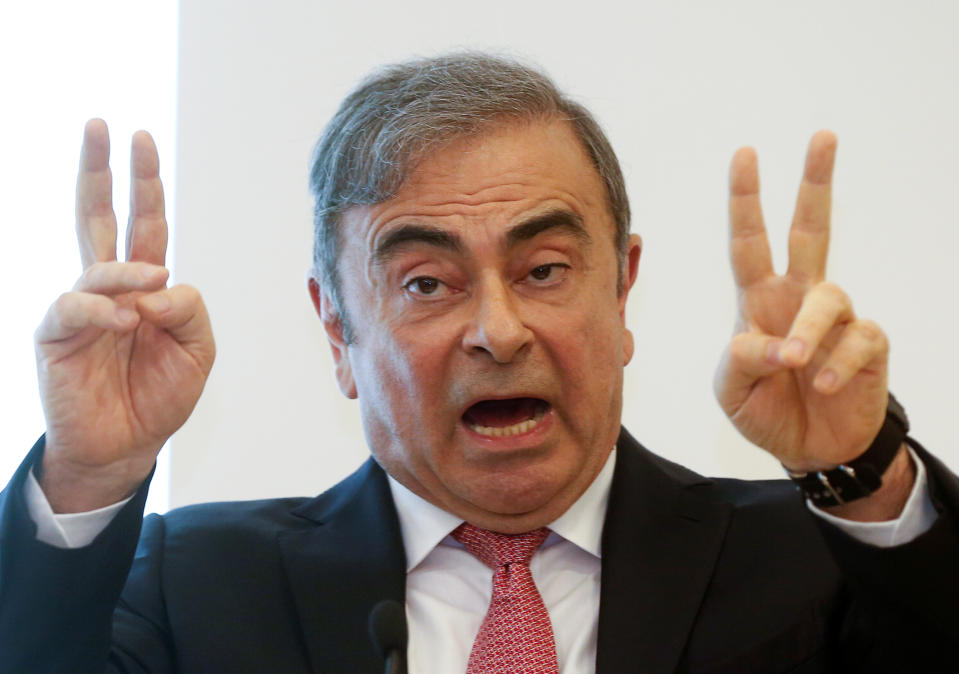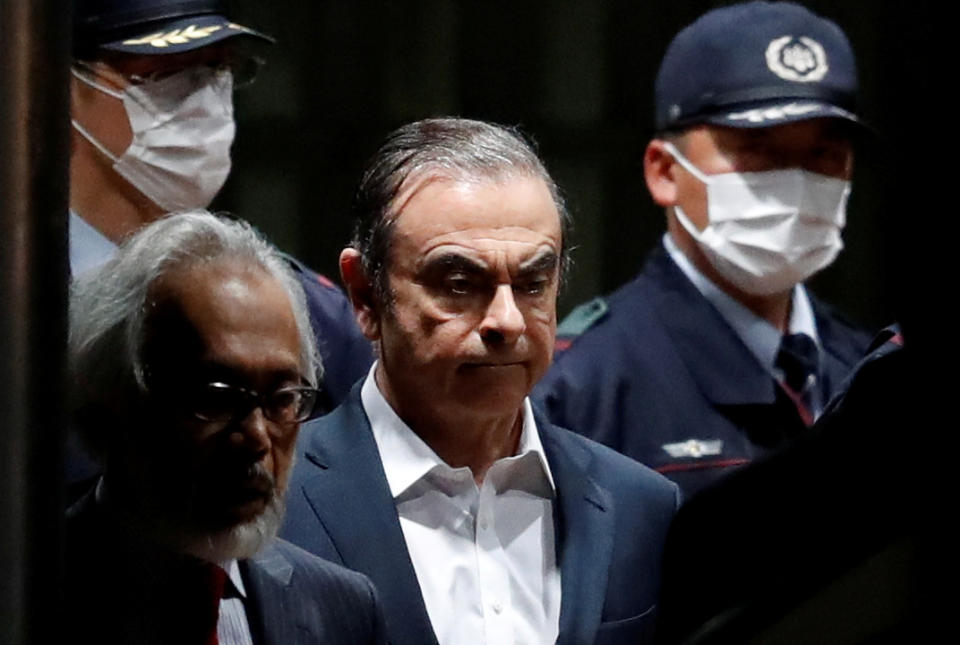'Pretty much everybody prosecuted gets convicted:' Carlos Ghosn exposes Japan to new scrutiny
Ex-Nissan CEO Carlos Ghosn excoriated the Japanese legal system this week during a two-hour press conference defending his decision to flee the country as he awaited trial for financial crimes tied to the Japanese automaker.
“I did not escape justice. I fled injustice and persecution, political persecution,” Ghosn said at a press conference in Beirut, Lebanon on Wednesday. “You're going to die in Japan or you've got to get out.”
The condemnation from Ghosn, once dubbed “an auto industry superhero,” opens up Japan’s legal system to increased scrutiny ahead of the Summer Olympics in Tokyo. It’s a system whose prosecutors secure convictions over 99% of the time. It’s one that allows a trial by a jury of one’s peers only for certain crimes. And it’s one that, according to Ghosn, interrogated him without the presence of his lawyers and denied him the right to a quick trial on trumped-up charges.
“This whole incident has taken a criminal justice system that I think has often been shielded from the view of the world and it’s brought it front and center,” says Matthew Wilson, president of Missouri Western State University, who’s a lawyer with extensive experience working in Japan.
‘Pretty much everybody gets convicted’
Ghosn — a 65-year-old Brazilian-born French and Lebanese citizen — asserted that he’d been deprived of freedom since his arrest in November 2018 for allegedly under-reporting his compensation in public filings. He was detained for more than 100 days before his release on $8.9 million bail in March and his cinematic escape late last month.

In his press conference on Wednesday, Ghosn suggested that he fled to Lebanon because his conviction in Japan was a foregone conclusion. He’s not necessarily being paranoid. As has been widely reported, Japan has over a 99% criminal conviction rate.
“Pretty much everybody prosecuted gets convicted,” says J. Mark Ramseyer, a professor of Japanese legal studies at Harvard Law School and a noted authority on Japanese law. Still, he noted, “The Japanese system, it’s basically a fair one.”
While the 99% conviction rate might suggest a rigged system, experts on Japanese law are quick to point out that prosecutors there are extremely selective about which cases they take on.
“There’s surprisingly few prosecutors in Japan and so they’re overworked,” Ramseyer told Yahoo Finance, noting that they therefore focus on the “slam dunk” cases.
‘Two extremes in executive compensation’
The case against Ghosn began in November 2018, when he was arrested on his corporate jet after it landed at a Tokyo airport and accused of failing to report millions of dollars in compensation. A 2010 Japanese law requires companies to disclose top executive pay, a kind of “social sanction” meant to embarrass companies that overpay their chiefs, according to Bruce Aronson, an affiliated scholar at the U.S.-Asia Law Institute at the NYU School of Law.
“The U.S. and Japan are two extremes in executive compensation,” Aronson said, explaining that outsize CEO compensation is not as socially acceptable in Japan as it is in the U.S.
Still, it would have been “bizarre” to haul Ghosn to jail simply for failing to report part of his compensation, according to Ramseyer, the Harvard Law School professor.

Ultimately, those were not the only charges against Ghosn. He was re-arrested in December 2018 and accused of shifting personal investment losses to Nissan and hiding more income. Japanese prosecutors arrested him yet again in April 2019, accusing him of shifting $5 million meant for an overseas distributor to his own company.
For his part, Ghosn contends that Nissan conspired to have him prosecuted because they feared he would merge Nissan with the French carmaker, Renault, where he was formerly the CEO.
In a statement last week, Nissan called Ghosn’s escape to Lebanon “extremely regrettable.” The automaker said it “discovered numerous acts of misconduct by Ghosn through a robust, thorough internal investigation” and that he was “not fit to serve as an executive.”
A unique criminal justice system with its own flaws
Like every criminal justice system, Japan’s has flaws. While Japan provides jury trials for some violent crimes, Ghosn likely would have been tried by a panel of three judges — individuals paid by the very government that was prosecuting him. And even if those judges acquitted Ghosn, he couldn’t consider himself a free man. That’s because, unlike in the U.S., Japan allows prosecutors to appeal cases if they lose them.
“Almost without exception, when a prosecutor loses … they are going to appeal. That’s almost automatic,” says Wilson, the Missouri Western State president with extensive experience working in the Japanese legal system.
While a trial by a jury of independent peers might seem more fair than one by judges, Aronson of NYU’s U.S.-Asia Law Institute noted that Japan has one of the world’s most independent judiciary systems despite Ghosn’s claims that the system is corrupt.
“You can’t bribe a judge in Japan,” Aronson said, noting that Ghosn fled to Lebanon, a country ranked by Transparency International’s Corruption Perceptions Index as more corrupt than 137 other countries, including Japan (which was just more corrupt than 17 other countries.)
Still, Ghosn’s case was an unusual one even in Japan, in part because he faced prison time for allegations related to financial crimes. “White collar criminals almost never go to prison [in Japan], which is not true in the U.S.,” Aronson said. “In the U.S., I think there’s more of a range of outcomes.”
The fact that Ghosn did face criminal charges raises legitimate questions about how Japan treats all of its criminal defendants, not just those with the means to be spirited away to a friendly country.

In April 2019, over 1,000 Japanese professionals and lawyers wrote a letter calling to reform Japan’s legal system. The letter noted that criminal defendants aren’t allowed to contact family members (in Ghosn’s case, he could have no contact with his wife), and that most suspects in jail were “placed under constant surveillance.”
“Japan’s criminal justice practices have long been described as ‘hostage justice (hitojichi-shiho).’ The Code of Criminal Procedure of Japan allows suspects to be detained up to 23 days before indictment. The authorities interpret the code to oblige detainees to face interrogations throughout this period. ... It is not uncommon for suspects to be yelled at from close range. Furthermore, suspects are not allowed to have lawyers present during questioning,” the letter noted.
In recent years, Japan has made certain reforms to its criminal justice system. Japan abolished trial by jury in 1943 but reintroduced it for certain crimes in 2009. Just In 2018, the country created a system for plea bargaining allowing more lenient sentences for defendants who feed prosecutors information about other suspects. The spotlight that Ghosn cast on the system’s shortcomings may spur further reforms to that system, especially as Japan prepares to welcome the world for the Olympics.
In the meantime, Ghosn may remain in Lebanon, which does not have an extradition treaty with Japan but imposed a travel ban on the former Nissan executive this week. Unless he faces a trial outside of Japan, it may never be clear whether the allegations against him have any merit.
“If in fact he’s been stealing from the company,” noted Ramseyer, the Harvard Law School professor, “it’s hard to feel terribly sorry for him.”
Erin Fuchs is deputy managing editor for Yahoo Finance.
Read More:
Boeing, Nike, and McDonald’s: Why CEO turnover spiked in 2019
Where is Elizabeth Holmes now? Dealing with the Theranos criminal fraud case

 Yahoo Finance
Yahoo Finance 
